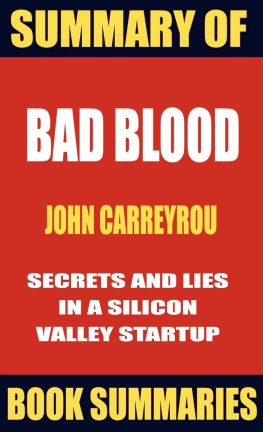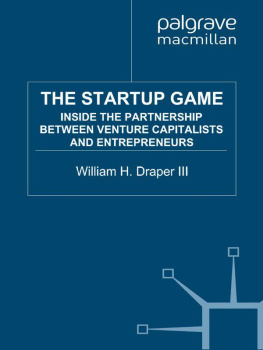Copyright 1994 by Jerry Kaplan
All rights reserved
For information about permission to reproduce selections from this book, write to Permissions, Houghton Mifflin Harcourt Publishing Company, 215 Park Avenue South, New York, New York 10003
www.hmhco.com
The Library of Congress has cataloged the print edition as follows:
Kaplan, Jerry.
Startup : a Silicon Valley adventure / Jerry Kaplan,
p. cm.
Includes index.
ISBN 0-395-71133-9
1. GO CorporationHistory. 2. Computer industryCaliforniaSan Mateo County. 3. EntrepreneurshipUnited StatesCase studies. 4. Pen-based computersHistory. 5. Kaplan, Jerry [Samuel Jerrold Kaplan]. I. Title.
HD 9696. C 64 G 615 1995
338.7'6100416dc20 94-45110
CIP
e ISBN 978-0-544-39127-7
v1.0614
For Lily Layne Kaplan
Born August 28, 1994
Prologue
G OING, GOING, GONE . The auction was over. The last of the obsolete personal computers, engineers cubicles, and other debris of a corporate shipwreck was finally liquidated, sold piecemeal to a crowd of hopeful entrepreneurs looking for a bargain to help float their new ventures. A few curious bottom fishers hovered around the stacked remains of electronic pens, flat-panel displays, and plastic cases, picking over the artifacts of the dead companys product: a portable computer operated by a pen instead of a keyboard.
To those of us who had pinned our hopes on this novel concept, the auction seemed vaguely sacrilegious, like watching treasure hunters dredge up human remains in their search for valuables. But it was clear to me, as the person who had launched the enterprise in the first place, that our passions and ideas had simply outlived their host, only to take root elsewhere in Silicon Valley. GO Corporation, and its offspring, EO, never quite found its market, but the concept of a pen computer remains as seductive as ever.
Still, I had to accept that impossible, final truth: GO was gone. Six years, hundreds of jobs, $75 millionall gone. If statistics were all that mattered, the story would end here. But behind the numbers lies a portrait of life at the edge of the corporate universe, where the intrepid and the imprudent play a perpetual high-stakes game of creation. The goal is to establish new companies, magical engines of prosperity that spawn products, jobs, and wealth. The price of admission is a radical idea, one powerful enough to motivate people, attract investment, and focus societys energy on improving the way people work and play. But there is also a darker side to the story, a cautionary tale about what can happen to a young company when its timing is wrong, its technology too speculative, and its market not yet ready.
As the winning bidders arranged to pick up their goods, I realized that the origin of GO could be traced back well before its founding in 1987, to a day in early 1979 when I first learned the truth about scientific progress from my Ph.D. dissertation advisor at the University of Pennsylvania.
A shy Indian man with a shiny, balding head and an occasional stutter, Dr. Joshi was widely known for his brilliant work in artificial intelligence. Our weekly meetings to help me find a thesis topic were more like therapy sessions than academic discussions. Most of the time he would sit silently behind his desk, watching me wrestle with some difficult question at the blackboard. When I was particularly down, he would offer a cryptic bit of encouragement: Youre not wrong, you know.
I had spent the past several months puzzling obsessively over an obscure problem in computational linguistics. One day, I explained to Dr. Joshi that I had searched the entire library for a clue to the solution, but without success.
Perhaps you should try a different approach, Jerry.
Like what?
He pointed to the clock on his wall. It was round with no numerals, only single tick marks for the hours. What time is it?
Four-thirty. I thought he was pointing out that our hour was up. Instead, he walked over and rotated the clock a quarter turn to the right.
Now what time is it? In its new position, the clock looked exactly as it had before, except for the position of the hands.
Seven forty-five.
Are you certain? Rotating a clock doesnt change the time, does it? He had a point, but I didnt know what to make of it. It only says four-thirty because someone decided thats what it means. Whats on the wall is a dial with two hands, yet what you see is the time. I was still confused. He sighed, then continued. All thats happened is that youve walked to the edge of the great mosaic of human knowledge. Up until now, youve been living in a world full of ideas and concepts that other people have set out for you. Now its your turn. You get to design a piece of the mosaic and glue it down. It just has to fit with what else is there. And if you do a good job shaping your tile, it will be easier for the next person to fit his around yours.
Youre saying that Ive been looking for an answer when really I should be making one up?
He looked relieved. Dont believe the bull about science being only an objective search for truth. Its not. Being a scientist also requires the skills of a politician. Its a struggle to define the terms, to guide the debate, and persuade others to see things your way. If youre the first one thereagain he pointed to the clockyou get to say what it is that others will see.
As I drove back to my apartment, the answer to my problem came to me. When I got inside, I called Dr. Joshi and gave him a hasty review of my thinking. I could hear the sound of chalk against blackboard as he worked out the logic. After a long silence, he finally spoke. Beautiful. Now all you have to do is write it up and get out of here. Theres nothing else I can teach you.
Surely, I thought, he was being funnythis was just his way of complimenting me on a good idea. Come on, thats not true at all! I said.
I suppose there is one other thing. He suddenly sounded more serious.
Whats that?
Just remember that ideas last longer than people or things. Your ideas will go further if you dont insist on going with them.
You know, he was not wrong.
The Idea
I S THIS THING war surplus?
Huh?
The taxi driver didnt get it. We were racing down a narrow road in the suburbs of Boston, lurching from pothole to pothole. Each bump rattled the vehicle as though a shell had exploded nearby. The maroon logo on the door read Veterans Taxi. The driver was vintage antiwar sixtiesshort graying beard, ponytail held by a rubber band, and a Cossack hat with ear flaps as a concession to the bitter February cold. I was to meet Mitchell Kapor at Hanscom Field at nine A.M. sharp to check out his new toy, a personal jet. The trip from the Cambridge offices of Lotus Development Corporationthe company he had founded in 1982, only five years earlierwas supposed to take less than thirty minutes, but I was late, and lost. Mitchell had been clear that he wanted to depart promptly so we could arrive in San Francisco in time for his lunch appointment.
The pavement widened without warning, and a stoplight signaled our reentry into the civilized world. The access road circled the field to the Butler Aviation terminal, where the private planes were parked. As instructed, we drove through an unobtrusive gate onto the field. Several small planes and a single jet sat in the passenger loading area, randomly scattered like animals maintaining a safe distance at a communal watering hole. I was relieved to see Mitchell just ahead of us, pulling suitcases and tote bags from the trunk of his dark gray 1984 Audi sedan.
The unmarked jet was painted a nondescript brown and beige. A narrow gangway of four or five steep steps was carved out of its middle. Two large men in vaguely official dark blue outfits sporting epaulets and caps stood at ease on either side of the stairs, waiting for a limousine to deliver their new boss, the founder of the worlds largest independent software company. They nervously eyed the two young men in blue jeans struggling toward them with bags hanging off both shoulders.
Next page









